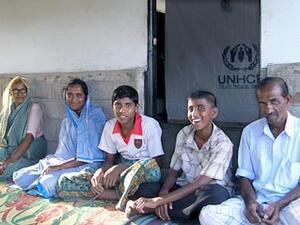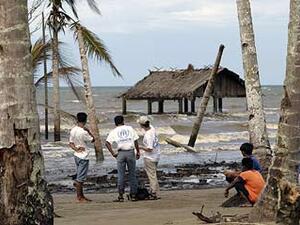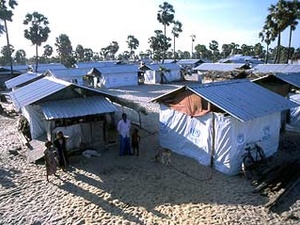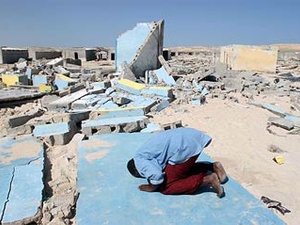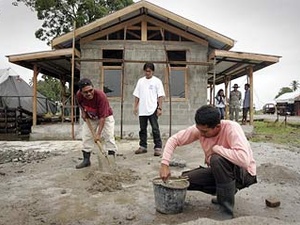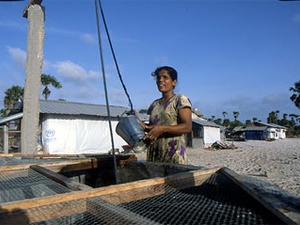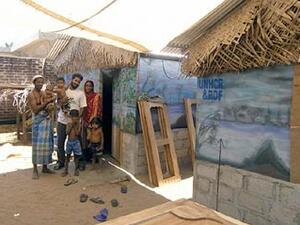Tsunami response: Indonesia and Sri Lanka latest
Tsunami response: Indonesia and Sri Lanka latest
UNHCR's tsunami relief efforts in Indonesia's Aceh province are focused both on getting emergency shelter and supplies to devastated villages which are still isolated, as well as laying the groundwork for the rebuilding of entire communities. Earlier in the week, the Swiss helicopters helping out with UNHCR's relief efforts started transferring emergency supplies to the small village of Keude Panga, 20 km south of Calang, where we estimate 2,000 displaced people need assistance. Eight tonnes of tents, blankets, kitchen sets, and mattresses have been airlifted in the village, which is cut off from our operational bases in the towns of Calang and Meulaboh because of destroyed bridges and roads. We are continuing to send supplies in by helicopter.
Meanwhile, in the destroyed fishing village of Krueng Sabe, 8 km from Calang, UNHCR, Indonesian authorities and other agencies are working together on a recovery and rebuilding programme. An estimated 50 per cent of Kreung Sabe's population was swept away in the tsunami, leaving 4,000 displaced. But fisher families that survived the giant waves are adamant about restarting their lives in the same place. They've made it clear the village is their home territory, they know the land and the sea, and they definitely do not want to relocate. Respecting the villagers' wishes, the proposed rebuilding plan will take into account permanent shelter but also essential community infrastructure, including mosques, health, water, sanitation and education facilities. Special attention will be given to the needs of vulnerable groups, including separated children, single parent families and the elderly. A senior UNHCR planning expert is in the village to help with site design. In the meantime, UNHCR erected some 500 tents over the last week as temporary housing for the displaced.
Further along the west coast at Meulaboh, UNHCR is expanding the Lehan camp site (Perum Nas Lapang) that we recently designed and erected to accommodate 112 families. However, the Indonesian authorities moved 135 families into the camp who were previously staying with host families. In order to accommodate the extra families, we're working to expand the site for an additional 56 tents.
Site clearance for a second UNHCR-designed camp at Alue Peunyarentg has been halted by Indonesian authorities over what seems to be a disagreement over the site location. The camp was intended to house 350 families currently living in squalid conditions. Site clearance started about a week ago and continued for five days until it was stopped. Since then, UNHCR has been shown three different sites for the camp. However, the final decision will only be taken when the appropriate authorities are back in town to give the go-ahead.
In Sri Lanka, more than 160,000 people have received UNHCR plastic sheeting amid ongoing distribution of non-food relief items. UNHCR is also working with local authorities in the south and north-east to supply 2,000 tents to people who need them most - vulnerable families or those moving out of public buildings like schools. These tents were airlifted by the Saudi Red Crescent Society from Jordan. Another 2,500 tents are expected to arrive from Pakistan this weekend, donated by AmeriCares. An additional 5,500 are set to arrive from Jordan in mid-February, courtesy of the Kuwaiti NGO, International Islamic Charitable Organization.
At the same time, we are conducting a survey to learn more about the IDPs' specific needs, preferences and requirements for access to information on relocation. The assessment, expected to last 10 days, will be cover 300 households in the east (Ampara), south (Galle) and north (Jaffna). The information gathered will enable the international community to support the government's decision-making on relocation/resettlement of displaced persons in accordance with the UN Guiding Principles on Internal Displacement.


